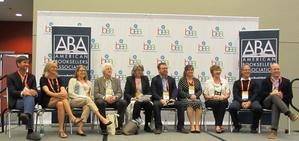 |
|
| ABA's board at yesterday's Town Hall. | |
At the American Booksellers Association's town hall meeting yesterday, member booksellers discussed a plethora of topics, including selling books through IndieBound, a centralized system for invoicing and payments and especially efforts around the country to raise the minimum wage.
Minimum Wage
By far the biggest topic of concern at the town hall meeting was minimum wage. Christin Evans of the Booksmith in San Francisco, Calif., opened the floor, encouraging booksellers to communicate to officials that if they intend to raise the minimum wage, they should do it in ways that do not have disproportionate negative impacts on small businesses. Despite the potential for a tough transition, she said, "long term I think it will be really great for our business."
A bookseller from Salem, Ore., pointed to the three-tiered system of raising minimum wage adopted by the state of Oregon as something that booksellers in other states could push for, while a bookseller from Pleasanton, Calif., asked if the ABA could do more to help member bookstores provide affordable health insurance for employees and generally make the financial situation more viable for frontline booksellers and bookstore employees. ABA CEO Oren Teicher explained that as a trade association, the ABA could not provide health insurance under the Affordable Care Act.
Betsy Burton, board president and co-owner of the King's English Bookshop in Salt Lake City, Utah, said the board was "constantly aware" of this problem and was striving to improve the financial environment for bookstores and booksellers. John Evans, board member and co-owner of Diesel, a Bookstore in Oakland, Larkspur and Brentwood, Calif., acknowledged that due in part to the "relationship bookstores have with publishers," bookselling is to some degree a structurally "underpaid profession," noting that concerns about raising the minimum wage have to do with bottom-line realities rather than general disapproval of the idea. Evans added that he imagined "everybody on the board and most people in the audience are all for increased wages for frontline booksellers."
Removing Prices from Books
During the broader discussion on minimum wage increases, Bill Petrocelli, co-owner of Book Passage, Corte Madera and San Francisco, said that because prices are printed on books, booksellers are the "only business in America that can't set our own operating margin. Publishers set our operating margin, not us." He advocated getting rid of printed prices in order to give booksellers better flexibility with pricing. Said Petrocelli: "In a way, we're like serfs."
Pete Mulvihill, board member and co-owner of Green Apple Books in San Francisco, said that philosophically he agreed with Petrocelli, but was not sure if he could realistically get away with raising prices.
An ensuing straw poll of attendees showed that ABA members were deeply divided on the issue. As a trade organization, noted Oren Teicher, the ABA couldn't advocate for a change without a clear consensus of members on the change.
Gayle Shanks, co-owner of Changing Hands, Tempe and Phoenix, Ariz., also encouraged the ABA regularly to poll members on a variety of issues.
Following Up 'Amazon and Empty Storefronts'
Several booksellers wondered how best the ABA could follow up the Civic Economics study Amazon and Empty Storefronts that was released at Winter Institute. Oren Teicher said that the ABA was currently working with Civic Economics to replicate the study in the United Kingdom and invited booksellers to make use of the online New Localism tool kit. Betsy Burton noted that Local First organizations around the country are all "using that study gleefully and frequently."
Kenny Brechner of DDG Booksellers, Farmington, Maine, emphasized the importance of combining many of these issues, including minimum wage, the broader economic effect of Amazon, and others into a more seamless narrative to raise public awareness. Tom Lowenburg, co-owner of Octavia Books in New Orleans, La., proposed suggesting to elected officials that they not do business with those who don't pay taxes or don't have nexus in a given state.
IndieBound Pilot Program
At the last town hall meeting, at Winter Institute, booksellers expressed concern that the pilot program to sell books directly through IndieBound would result in the cannibalization of sales of member bookstores or deplete ABA resources that could be used on other initiatives. Board vice-president Robert Sindelar of Third Place Books in Lake Forest Park and Ravenna, Wash., reported that, based on the results of the pilot program, there was little chance of either occurring. Sindelar also noted that the program will be continued for another six months in order to have data from an entire year.
Batch Invoicing
Also brought up was the possibility of streamlining invoicing and payment systems. A bookseller from St. Paul, Minn., expressed frustration that there was no easy way to check invoices and credit online in real time. Board president Betsy Burton responded that the board has been pursuing a centralized, online invoicing and payment system similar to Batch, a system developed by the Booksellers Association of the U.K. and Ireland. --Alex Mutter

